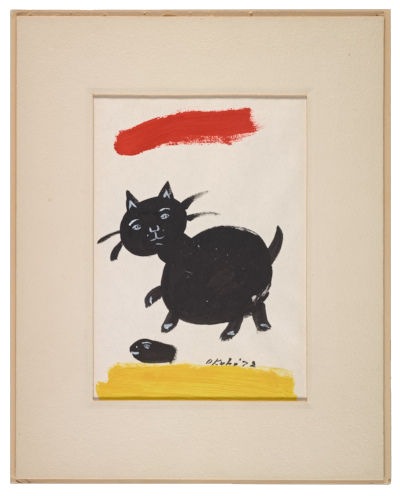ARTchivist's Notebook: An American experience
Reflecting on Miné Okubo's art, I discuss cruelty and its legacies.

I’ve been reading Miné Okubo: An American Experience, the catalog from a 1972 exhibition of the Japanese American artist’s work at the Oakland Museum. Interspersed in curator Shirley Sun’s text are long quotes from Okubo herself, who is best known for Citizen 13660, an illustrated memoir of her unjust incarceration in American concentration camps during World War II.
While that book is an honest account of what life was like in the camps, it only touches glancingly on the government’s violation of civil rights and the cruelty of incarceration. The quote on the page above reminded me of the way lives and families were summarily ripped apart: how a grieving father could be arrested and detained in secret for being involved in his church; how family members ended up in different states, unsure of each others’ whereabouts; how a young man could be conscripted to serve in the military of a country that had imprisoned his family.
Sometimes the camps feel like ancient history, but I continue to wake up to how they are ever-present in the U.S., not only for my family and the Japanese American community, but for all of us. From the decimation, dispossession, and containment of Indigenous communities at the founding of our nation, to the extralegal detentions and deportations of Mahmoud Khalil, Rumeysa Ozturk, Mohsen Mahdawi, Kilmar Abrego Garcia and hundreds of others today: the circumstances are different, but the pain and its reverberations across generations are/will be the same.
The government tried to destroy my community, just as it has continually tried to destroy BIPOC communities, and as it is trying now to destroy all marginalized communities. And we are still here and like Miné, we will continue to bear witness. This is a quintessentially American experience.
But it’s by no means unique
The continued genocide in Gaza is also weighing on me. Drop Site’s account of the bombing of the last operating restaurant in Gaza City is beyond horrifying and even non-violent, non-governmental attempts to provide food and medicine have been bombed. I don’t have any wisdom to share around this — I just felt like I needed to recognize it. I have been so preoccupied by the machinations of the U.S. government that I sometimes forget to look around. It is all an interlocking web of cruelty.
Speaking of which, you’ve probably heard by now that Trump has fired Librarian of Congress Carla Hayden, the first woman and the first Black person to serve in the role. EveryLibrary has started a petition in protest. Please sign it, contact your Congresspeople, and if you can, donate to EveryLibrary, and the American Library Association, who continue to fight for free and equitable access to trustworthy information for all. As government institutions are wantonly destroyed and turned into repressive instruments of autocracy, we need to continue to band together and support one another.
The Archival Workers Collective, a grassroots collective of archival workers, is soliciting stories of how the Trump administration has impacted archives & archival workers. Please share your story here. And here is a list of other data gathering efforts in the same vein:
American Association for State and Local History (AASLH) IMLS, NEH, and NPS Disruption Impact Survey
ATALM: Impact of the Loss or Reduction of Federal Funding on Tribal Cultural Institutions Survey
COSLA: Impacts of the Trump Administration on Archives and Archival Workers
Organization of American Historians Federal Employee and Contractors Oral History Project
The Impact Tracker (broad focus, not just LAMs)
California cultural heritage orgs documenting underrepresented and historically excluded communities: Groundwork Grants provide up to $20,000 for emergency preparedness to safeguard your collections. Deadline is June 2. Apply here.
And now, a palate cleanser

Years after the war, Okubo’s work took a more upbeat turn. Her paintings of people, animals, and flowers are full of satisfyingly rounded forms and bright colors. We need to bear witness, but we also need to welcome joy.